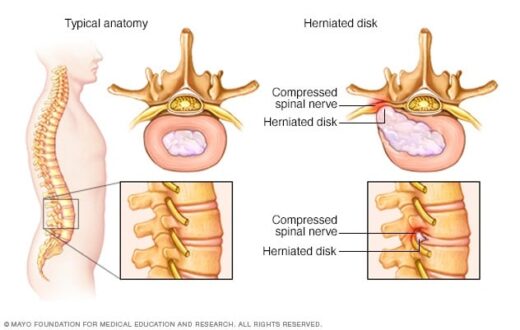herniated disk
Overview
A herniated disk refers to a problem with one of the rubbery cushions (disks) that sit between the bones (vertebrae) that stack to make your spine.
A spinal disk has a soft, jellylike center (nucleus) encased in a tougher, rubbery exterior (annulus). Sometimes called a slipped disk or a ruptured disk, a herniated disk occurs when some of the nucleus pushes out through a tear in the annulus.
A herniated disk, which can occur in any part of the spine, most often occurs in the lower back. Depending on where the herniated disk is, it can result in pain, numbness, or weakness in an arm or leg.
Causes
Most people can’t pinpoint the cause of their herniated disk. Sometimes, using the back muscles instead of the leg and thigh muscles to lift heavy objects can lead to a herniated disk, as can twisting and turning while lifting. Rarely, a traumatic event such as a fall or a blow to the back is the cause.
Symptoms
Most herniated disks occur in the lower back, but they can also occur in the neck. Signs and symptoms depend on where the disk is situated and whether the disk is pressing on a nerve. Herniated disks usually affect one side of the body.
Arm or leg pain. If your herniated disk is in your lower back, besides pain in your lower back, you’ll typically feel pain in your buttocks, thigh and calf. You might have pain in part of the foot as well.
For a herniated disk in your neck, you’ll typically feel the most pain in your shoulder and arm. This pain might shoot into your arm or leg when you cough, sneeze or move into certain positions. Pain is often described as sharp or burning.
- Numbness or tingling. People who have a herniated disk often have radiating numbness or tingling in the body part served by the affected nerves.
- Weakness. Muscles served by the affected nerves tend to weaken. This can cause you to stumble, or affect your ability to lift or hold items.

Treatments
- Nonprescription pain medications. If your pain is mild to moderate, your doctor might recommend pain medication available without a prescription, such as acetaminophen (Tylenol, others) ibuprofen (Advil, Motrin IB, others) or naproxen sodium (Aleve).
- Neuropathic drugs. These drugs affect nerve impulses to decrease the pain. They include gabapentin (Gralise, Horizant, Neurontin), pregabalin (Lyrica), duloxetine (Cymbalta, Drizalma Sprinkle), or venlafaxine (Effexor XR).
- Muscle relaxers. You might be prescribed these if you have muscle spasms. Sedation and dizziness are common side effects.
- Opioids. Because of the side effects of opioids and the potential for addiction, many doctors hesitate to prescribe them for disk herniation. If other medications don’t relieve your pain, your doctor might consider short-term use of opioids, such as codeine or an oxycodone-acetaminophen combination (Percocet, Oxycet). Sedation, nausea, confusion and constipation are possible side effects from these drugs.
- Cortisone injections. If your pain doesn’t improve with oral medications, your doctor might recommend a corticosteroid that can be injected into the area around the spinal nerves. Spinal imaging can help guide the needle.
Your doctor might suggest physical therapy to help with your pain. Physical therapists can show you positions and exercises designed to minimize the pain of a herniated disk.
Few people with herniated disks require surgery. Your doctor might suggest surgery if conservative treatments fail to improve your symptoms after six weeks, especially if you continue to have:
- Poorly controlled pain
- Numbness or weakness
- Difficulty standing or walking
- Loss of bladder or bowel control
In nearly all cases, surgeons can remove just the protruding portion of the disk. Rarely, the entire disk must be removed. In these cases, the vertebrae might need to be fused with a bone graft.
To allow the process of bone fusion, which takes months, metal hardware is placed in the spine to provide spinal stability. Rarely, your surgeon might suggest the implantation of an artificial disk.
Reviews on our treatments



